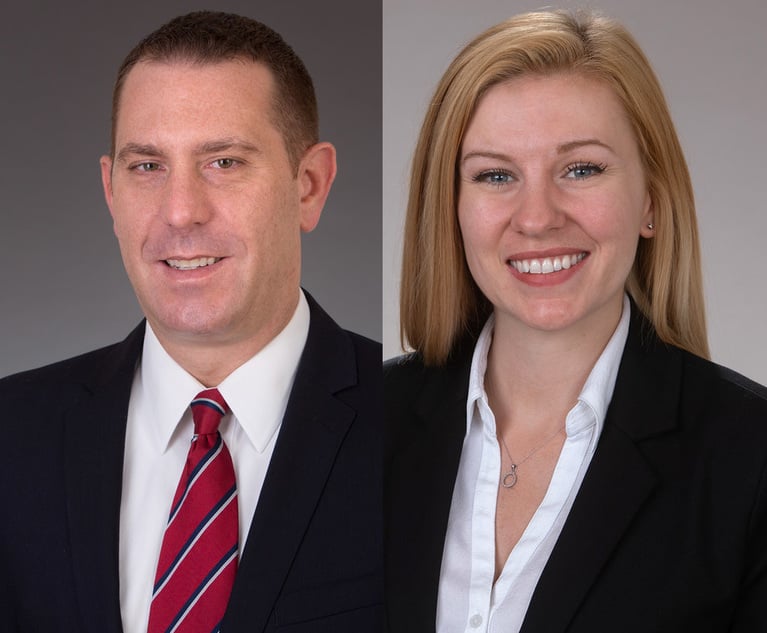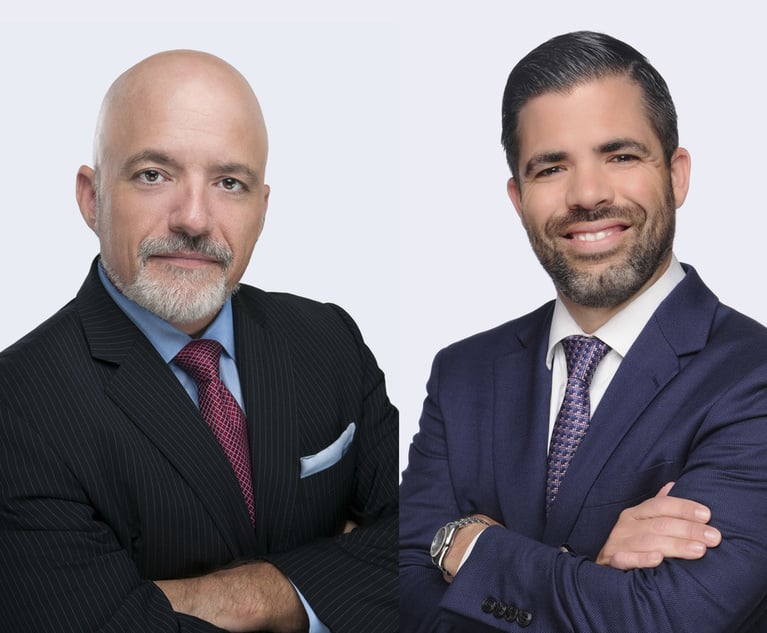Overly Technical Violations and the Rise of FCRA Class Actions
The new wave of class action lawsuits are based largely on technical violations of the Fair Credit Reporting Act (FCRA). The FCRA, by its name alone, appears unlikely to apply to most employment contexts, but think again.
March 15, 2018 at 10:45 AM
5 minute read
 Lanette Suarez, Fisher Phillips associate Fort Lauderdale
Lanette Suarez, Fisher Phillips associate Fort Lauderdale
The new wave of class action lawsuits are based largely on technical violations of the Fair Credit Reporting Act (FCRA). The FCRA, by its name alone, appears unlikely to apply to most employment contexts, but think again. The FCRA applies to any business that uses a consumer report for employment purposes. Consumer reports may include information related to criminal background checks, drug tests, driving records, employment history, credit checks, and more, when conducted by a third party. For example, if a company obtains a consumer report about a job applicant or uses a consumer report to terminate an employee, then the FCRA is implicated. If these situations strike a chord, then now is the time to reexamine your compliance with the FCRA; if not, be forewarned that violations of the FCRA have led to class action settlements that have cost employers millions of dollars.
The majority of recent lawsuits have alleged deficiencies in an employer's pre-employment FCRA notice and disclosure forms. These deficiencies have ranged from combining the forms with the employment application to including unnecessary information, like a waiver, in the disclosure form. Other claims have included a failure to provide job applicants or current employees with a copy of the consumer report or to use the term “consumer report” in the company's notice.
Noncompliance With the FCRA Could Mean Big Employer Payouts
These technical errors often result in no actual damages to the plaintiffs. However, they could spell out a financial disaster for an employer. FCRA litigation includes damages of $100 to $1,000 dollars for each individual violation and, in a class action setting, those dollar amounts can add up to multi-million dollar settlements. For example, recent class action settlements include a major transportation company that settled for $7.5 million, a major bank that settled for $12 million and a grocery chain that settled for $6.8 million.
Moreover, big settlements have spurred even more ligation. Currently, a major chain restaurant's applicants consolidated two separate class actions against the chain and a consumer reporting agency over background checks that allegedly violate the FCRA. Further, a major coffee shop company is facing a claim that it allegedly violated the FCRA by failing to give a job applicant the opportunity to contest the findings of an inaccurate background check that was used to deny the applicants' employment. Finally, a class action was filed against Brooklyn Events Center, LLC, alleging that it failed to provide rejected applicants with statement of rights, copy of consumer reports, and reasonable time to respond. These new cases are just a handful of the hundreds of cases across the country.
So, What Do We Do? The Keys to Success for FCRA Compliance and Prevention
A company can ensure compliance with the FCRA by keeping in mind that the FCRA requires employers to give applicants and employee's specific notice and disclosures at three particular time periods. Those time periods are: before an employer obtains a consumer report; before the employer takes adverse action based upon the contents of a consumer report; and after the employer takes adverse action based upon the contents of a consumer report.
First, before an employer obtains a consumer report, the employer must give written notification to the applicant or employee that the employer may obtain a consumer report for employment purposes, and the employer must get written authorization to obtain the report. Significantly, the notice or disclosure must be clear and conspicuous and contained in a document that consists solely of it. This is known as the “stand-alone document” requirement and has been a central focus of some of the FCRA class action litigation.
Next, an employer cannot take an adverse employment action based upon the contents of a consumer report without first providing notice to the individual. Specifically, the employer must provide a copy of the consumer report with a written description of the individual's rights under the FCRA. The employer must then wait a reasonable amount of time (generally five business days) before taking the adverse action in order to allow the individual to challenge the accuracy of the report.
Finally, if an employer carries out the adverse employment action, then the employer must provide to the applicant or employee a final notice of the adverse action. This notice must provide the name, address and phone number of the consumer reporting agency, inform the individual that they have the right to obtain a free copy of the report from the consumer reporting agency within 60 days, and that they may dispute the accuracy or completeness of any information in the consumer report. The notice must also provide a statement that the agency did not make the adverse decision and cannot provide specific reasons for it.
To help prevent FCRA violations, some employers have implemented an on-line integration system that includes applicant tracking software and disclosure and authorizations with e-signatures. Employers should also be aware that they may be subject to further state and local requirements relating to an employer's use of consumer reports and should comply with those additional obligations.
Overall, Make Changes Now!
Multi-million dollar lawsuits being filed over what appears to be issues of overly technical compliance with the FCRA is vexing, especially when many claimants are not harmed by the conduct. To avoid becoming part of the FCRA litigation wave, employers should review their current policies and procedures in order to ensure compliance with the FCRA.
Lanette Suarez is an associate in the Fort Lauderdale office of Fisher Phillips. She represents clients in all areas of labor and employment law including employment discrimination and retaliation claims, wage and hour disputes, and employment policies and procedures.
This content has been archived. It is available through our partners, LexisNexis® and Bloomberg Law.
To view this content, please continue to their sites.
Not a Lexis Subscriber?
Subscribe Now
Not a Bloomberg Law Subscriber?
Subscribe Now
NOT FOR REPRINT
© 2025 ALM Global, LLC, All Rights Reserved. Request academic re-use from www.copyright.com. All other uses, submit a request to [email protected]. For more information visit Asset & Logo Licensing.
You Might Like
View All



Don’t Forget the Owner’s Manual: A Guide to Proving Liability Through Manufacturers’ Warnings and Instructions
5 minute readTrending Stories
- 1Federal Judge Pauses Trump Funding Freeze as Democratic AGs Launch Defensive Measure
- 2Class Action Litigator Tapped to Lead Shook, Hardy & Bacon's Houston Office
- 3Arizona Supreme Court Presses Pause on KPMG's Bid to Deliver Legal Services
- 4Bill Would Consolidate Antitrust Enforcement Under DOJ
- 5Cornell Tech Expands Law, Technology and Entrepreneurship Masters of Law Program to Part Time Format
Who Got The Work
J. Brugh Lower of Gibbons has entered an appearance for industrial equipment supplier Devco Corporation in a pending trademark infringement lawsuit. The suit, accusing the defendant of selling knock-off Graco products, was filed Dec. 18 in New Jersey District Court by Rivkin Radler on behalf of Graco Inc. and Graco Minnesota. The case, assigned to U.S. District Judge Zahid N. Quraishi, is 3:24-cv-11294, Graco Inc. et al v. Devco Corporation.
Who Got The Work
Rebecca Maller-Stein and Kent A. Yalowitz of Arnold & Porter Kaye Scholer have entered their appearances for Hanaco Venture Capital and its executives, Lior Prosor and David Frankel, in a pending securities lawsuit. The action, filed on Dec. 24 in New York Southern District Court by Zell, Aron & Co. on behalf of Goldeneye Advisors, accuses the defendants of negligently and fraudulently managing the plaintiff's $1 million investment. The case, assigned to U.S. District Judge Vernon S. Broderick, is 1:24-cv-09918, Goldeneye Advisors, LLC v. Hanaco Venture Capital, Ltd. et al.
Who Got The Work
Attorneys from A&O Shearman has stepped in as defense counsel for Toronto-Dominion Bank and other defendants in a pending securities class action. The suit, filed Dec. 11 in New York Southern District Court by Bleichmar Fonti & Auld, accuses the defendants of concealing the bank's 'pervasive' deficiencies in regards to its compliance with the Bank Secrecy Act and the quality of its anti-money laundering controls. The case, assigned to U.S. District Judge Arun Subramanian, is 1:24-cv-09445, Gonzalez v. The Toronto-Dominion Bank et al.
Who Got The Work
Crown Castle International, a Pennsylvania company providing shared communications infrastructure, has turned to Luke D. Wolf of Gordon Rees Scully Mansukhani to fend off a pending breach-of-contract lawsuit. The court action, filed Nov. 25 in Michigan Eastern District Court by Hooper Hathaway PC on behalf of The Town Residences LLC, accuses Crown Castle of failing to transfer approximately $30,000 in utility payments from T-Mobile in breach of a roof-top lease and assignment agreement. The case, assigned to U.S. District Judge Susan K. Declercq, is 2:24-cv-13131, The Town Residences LLC v. T-Mobile US, Inc. et al.
Who Got The Work
Wilfred P. Coronato and Daniel M. Schwartz of McCarter & English have stepped in as defense counsel to Electrolux Home Products Inc. in a pending product liability lawsuit. The court action, filed Nov. 26 in New York Eastern District Court by Poulos Lopiccolo PC and Nagel Rice LLP on behalf of David Stern, alleges that the defendant's refrigerators’ drawers and shelving repeatedly break and fall apart within months after purchase. The case, assigned to U.S. District Judge Joan M. Azrack, is 2:24-cv-08204, Stern v. Electrolux Home Products, Inc.
Featured Firms
Law Offices of Gary Martin Hays & Associates, P.C.
(470) 294-1674
Law Offices of Mark E. Salomone
(857) 444-6468
Smith & Hassler
(713) 739-1250






